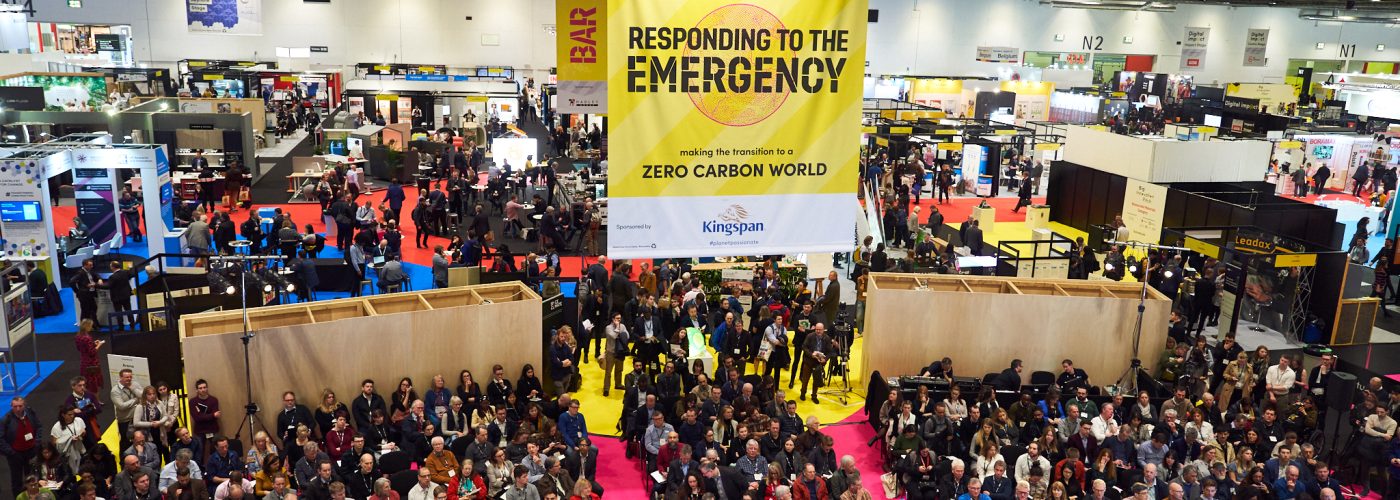UK emissions fell by nearly 50 per cent of their 1990 levels during the 2020 lockdown. According to The Guardian, this positive change will be short-lived. Carbon dioxide emissions are forecast to jump this year by the second biggest annual rise in history to help the economy recover after the pandemic. So, what can we do differently now to make a lasting positive impact on our environment and reduce emissions? Here Martin Hurn, event director at sustainable construction event Futurebuild, asks a group of industry thought leaders — who is responsible for the effective delivery of net-zero?

We are aware that any business that interacts with the construction industry, such as architects, builders and material manufacturers, has a legal obligation to take actions that will help the UK reach net zero. In reality, many businesses don’t know what part they should be playing, what actions they must take or how to effectively collaborate with other sustainable businesses to make it a reality. Additionally, who is responsible for ensuring that we do deliver net zero emissions?
Before knowing who is responsible for delivering net zero, we need to think about what that entails. For example, what does a client mean when they ask for a net zero building? According to the Institute for Government, it’s a property that balances the amount of greenhouse gases it produces during construction and day-to-day use with the amount it removes from the atmosphere.
Who is responsible?
One of the key contributors to reaching net zero in the UK is the government. In 2008, the government introduced the Climate Change Act in a bid to make Britain a low-carbon economy and with this act came environmental responsibility for the government. In April 2021, the government set the world’s most ambitious climate change target, of cutting emissions by 78 per cent by 2035, compared to 1990 levels. The government has introduced initiatives such as the Green Homes Grant to help homeowners lower emissions, but it is unclear if these made a lasting impact on net zero efforts. The government may have set the industry on the right path with these targets, but how is Britain and the construction industry going to deliver these ambitious targets?
“What the government has delivered so far is good, but it is not enough to get us through the next phase of transition,” commented Richard Twinn, Principal Consultant at Cundall. “Influence verses control over emissions are two different things and we need coordinated action.”
Legally enforcing a reduction in emissions, rather than making suggestions, forces businesses, especially in the construction industry, to start their net zero journey without clear guidance. Without a large amount of government support to join up these individual companies, the targets will become an unrealistic rather than a reachable goal.
Local authorities also have a part to play in educating construction businesses, manufacturers and the general public and help them to turn ambitions in actions. Dr Oliver Jones, Research Director at Ryder Architecture explained that “public and private sectors need to come together to deliver education on what net zero means and how we get there.”
Large businesses and small and medium enterprises can play their part by increasing their knowledge and desire to make sustainable changes. “There is a lack of incentive right now to dive in and take charge from smaller businesses,” commented Elaine Lewis, Managing Director at Cadventure. “This is mainly because of the unknown, perhaps the green agenda should place a greater focus on direct benefits to small businesses and their part in future proofing the industry.”
Construction materials developers and manufacturers have the opportunity to invest in research and development to help Britain reach net zero. “There is no correct answer as to whether we stick with tradition or look at innovative new materials,” explained Twinn. “Both have their merits and indeed we should embrace both for what they have to offer. Right now, we can’t eliminate the use of concrete for example, but should look to de-carbonise it.”
“The increase in development for bio-tech solutions, such as mycelium products is growing exponentially,” said Jones. “This is a whole new world of product development being pioneered by chemists and biologists who are passionate about realising a net zero future.”
Claiming the responsibility
Ultimately, there is no clear answer about who is solely responsible for reaching net zero, but by working together, the industry will stand a better chance of meeting our net zero carbon targets. Collaborating and investing in innovative technology and educating stakeholders will help the industry see the value in a net zero future and strive towards it in a unified way.
If the built environment industry is not united in its attempts to reach net zero, it will never be achieved. Without the government and local authorities, material manufacturers are not incentivised to create innovative materials. If architects do not have the knowledge about newly developed alternative materials, they will not include them in their designs. Construction workers and engineers must have an understanding about how to effectively install the materials to ensure they function effectively. Working together and learning from each other is the key to successfully reaching net zero — this is where Futurebuild comes in. Futurebuild cultivates cross sector collaboration, connecting the specifiers, decision makers and disruptors with innovative brands. This diverse audience makes Futurebuild the essential platform for net zero pioneers to launch disruptive technologies and share new ways of thinking to inspire transformational change and pave the way for a sustainable built environment. To find out more about pioneering construction technology or sign up to our next event, visit our website https://www.futurebuild.co.uk





